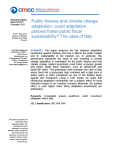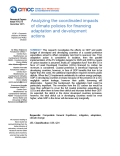Baltic Energy Technology Scenarios 2018 (BENTE) is a scenario-based energy system analysis that explores the changes in the Baltic countries’ energy systems. What are the drivers and their impacts in the following decades? What would be required for the Baltic countries to meet their climate and energy targets in 2030, and what development would lead the Baltics towards a 2°C pathway?
The report finds that the Baltic countries’ proposed renewable energy (RE) targets can be achieved using domestic resources. More renewable energy (electricity, heat and fuels) lets energy demanding sectors reduce GHG emissions and increase the RE share. However, the Baltic countries still do not reach their Effort Sharing Sector’s 2030 targets in the 4°C Scenario (4DS). Without policies to stimulate local renewable energy generation, the Baltics are likely to become large net importers of electricity.


